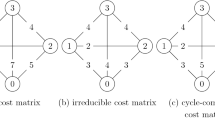Abstract
We provide a new technique to derive group strategyproof mechanisms for the cost-sharing problem. Our technique is simpler and provably more powerful than the existing one based on so called cross-monotonic cost-sharing methods given by Moulin and Shenker [1997]. Indeed, our method yields the first polynomial-time mechanism for the Steiner tree game which is group strategyproof, budget balance and also meets other standard requirements (No Positive Transfer, Voluntary Participation and Consumer Sovereignty). A known result by Megiddo [1978] implies that this result cannot be achieved with cross-monotonic cost-sharing methods, even if using exponential-time mechanisms.
Work supported by the European Project IST-2001-33135, Critical Resource Sharing for Cooperation in Complex Systems (CRESCCO).
Preview
Unable to display preview. Download preview PDF.
Similar content being viewed by others
References
Biló, V., Di Francescomarino, C., Flammini, M., Melideo, G.: Sharing the cost of muticast transmissions in wireless networks. In: Proceedings of SPAA, pp. 180–187 (2004)
Dutta, B., Ray, D.: A concept of egalitarism under participation constraints. Econometrica 57, 615–635 (1989)
Jain, K., Vazirani, V.V.: Applications of approximation algorithms to cooperative games. In: Annual ACM Symposium on Theory of Computing (STOC), pp. 364–372 (2001)
Kent, K., Skorin-Kapov, D.: Population monotonic cost allocation on MST’s. In: Operational Research Proceedings KOI, pp. 43–48 (1996)
Leonardi, S., Schäfer, G.: Cross-monotonic cost-sharing methods for connected facility location games. Technical Report MPI-I-2003-1-017, Max-Plankt-Institut für Informatik (September 2003)
Megiddo, N.: Cost allocation for steiner trees. Networks 8, 1–6 (1978)
Moulin, H.: Incremental cost sharing: characterization by coalition strategy-proofness. Social Choice and Welfare 16, 279–320 (1999)
Moulin, H., Shenker, S.: Strategyproof sharing of submodular costs: budget balance versus efficiency (1997), http://www.aciri.org/shenker/cost.ps
Pál, M., Tardos, É.: Group strategyproof mechanisms via primal-dual algorithms. In: Proceedings of FOCS (2003)
Penna, P., Ventre, C.: More powerful and simpler cost-sharing methods. TR of the European Project CRESCCO (2004), http://www.ceid.upatras.gr/crescco/
Shapley, L.S.: A value of n-person games. In: Kuhn, H., Tucker, W. (eds.), Princeton University Press, Princeton (1953)
Author information
Authors and Affiliations
Editor information
Editors and Affiliations
Rights and permissions
Copyright information
© 2005 Springer-Verlag Berlin Heidelberg
About this paper
Cite this paper
Penna, P., Ventre, C. (2005). More Powerful and Simpler Cost-Sharing Methods. In: Persiano, G., Solis-Oba, R. (eds) Approximation and Online Algorithms. WAOA 2004. Lecture Notes in Computer Science, vol 3351. Springer, Berlin, Heidelberg. https://doi.org/10.1007/978-3-540-31833-0_10
Download citation
DOI: https://doi.org/10.1007/978-3-540-31833-0_10
Publisher Name: Springer, Berlin, Heidelberg
Print ISBN: 978-3-540-24574-2
Online ISBN: 978-3-540-31833-0
eBook Packages: Computer ScienceComputer Science (R0)



